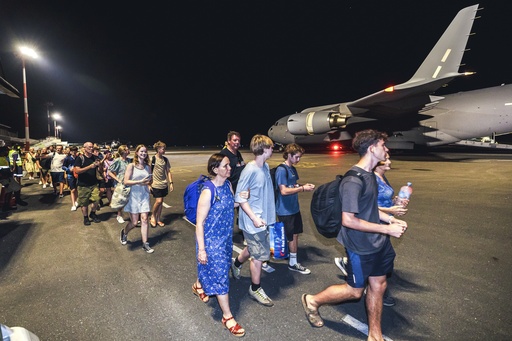WELLINGTON, New Zealand — In the aftermath of a devastating earthquake that struck two days ago, Ivan Oswald and his team at Nambawan Cafe on Vanuatu’s picturesque waterfront readied themselves on Thursday for lunchtime service.
However, instead of their regular menu, they served defrosted sausages intended for emergency personnel who were tirelessly searching through the debris for both survivors and victims after the powerful 7.3 magnitude quake hit Port Vila, the capital city of Vanuatu. In addition to local rescuers, specialists from Australia, New Zealand, and France have joined the search efforts, arriving in waves throughout Thursday.
Earthquakes are not an uncommon occurrence for the South Pacific nation, which comprises 80 islands and a population of about 330,000. Nevertheless, the quake that shook the region on Tuesday was unprecedented in its intensity. The earthquake’s epicenter was approximately 30 kilometers (19 miles) offshore, with a depth of 57 kilometers (35 miles), and was followed by hundreds of aftershocks that continued to rattle the area.
As of Thursday, the number of casualties remained uncertain, with official reports still being compiled. Initially, the government confirmed 14 fatalities; however, by Wednesday, the local hospital had verified only nine deaths, with expectations that the toll could rise further. More than 200 individuals have been treated for injuries, but this figure has not been updated for over a day.
Telecommunications services have started to improve, albeit sporadically, by Thursday afternoon, following a near-total blackout that ensued post-quake. This partial restoration has allowed residents to assess the extent of damage and to gather information about missing friends and family.
With Nambawan Cafe now operational, locals, tourists, and rescuers have been coming in to charge their devices and reach out to loved ones. “We’ve had a few tears,” Oswald remarked, acknowledging the emotional strain the situation has placed on everyone. “I can’t contribute to the rescue efforts, but I can provide this service.”
As the situation developed, it became increasingly clear that the most severe damage was concentrated in the downtown area of Port Vila, once bustling with lunchtime shoppers on Tuesday. Some peripheral islands and villages close to the quake’s epicenter have been affected by landslides, further complicating the recovery process.
The United Nations Office for the Coordination of Humanitarian Affairs reported severe infrastructure damages, including to hospitals, roads, and essential facilities such as water reservoirs and gas lines. Access to some areas has hindered response operations, with a massive landslide having obstructed the seaport, obstructing the transportation of necessary supplies and personnel. Although the airport reopened for humanitarian missions on Thursday, it is still assessing the possibility of resuming commercial flights.
Aid organizations have expressed particular concern regarding the availability of clean drinking water and adequate shelter for evacuees. The main utilities provider, UNELCO, indicated that the restoration of water service could take up to two weeks, prompting urgent action according to local media sources.
As search operations continued in the city center, focused on two collapsed buildings, structural assessments of homes and businesses across Port Vila need to be conducted to ensure safety before they can welcome occupants again.
On Thursday, Australian search teams collaborated with local residents who have continued to look for individuals trapped beneath the rubble. Despite initial hopeful rescues that boosted morale on Tuesday and Wednesday, residents reported a growing sense of despair regarding the chances of finding anyone still alive.
The situation remains dire, as the exact number of individuals still unaccounted for remains unknown. Among the deceased were two Chinese citizens, as reported through official channels.
In addition to human suffering, the earthquake has also posed a significant economic threat to Vanuatu, especially with the timing occurring at the start of the summer tourism season. Glen Craig, the chair of the Vanuatu Business Resilience Council, voiced concerns about the potential long-term impacts if tourists fail to return. “We’ve had such bad luck,” Craig lamented, alluding to the three cyclones that plagued the nation earlier in the year and the collapse of the national airline in May. “We were just getting back on our feet and were really looking forward to a prosperous summer.”


